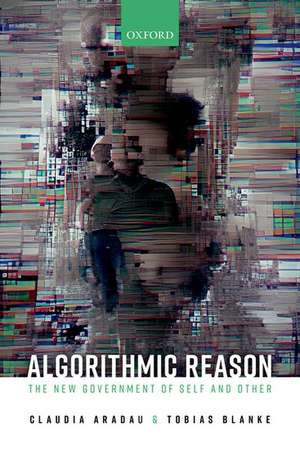Algorithmic Reason: The New Government of Self and Other
Autor Claudia Aradau, Tobias Blankeen Limba Engleză Hardback – 7 mai 2022
Preț: 582.16 lei
Preț vechi: 833.88 lei
-30% Nou
Puncte Express: 873
Preț estimativ în valută:
111.39€ • 116.62$ • 92.17£
111.39€ • 116.62$ • 92.17£
Carte disponibilă
Livrare economică 05-11 martie
Livrare express 28 februarie-06 martie pentru 134.57 lei
Preluare comenzi: 021 569.72.76
Specificații
ISBN-13: 9780192859624
ISBN-10: 0192859625
Pagini: 282
Dimensiuni: 162 x 241 x 20 mm
Greutate: 0.59 kg
Editura: OUP OXFORD
Colecția OUP Oxford
Locul publicării:Oxford, United Kingdom
ISBN-10: 0192859625
Pagini: 282
Dimensiuni: 162 x 241 x 20 mm
Greutate: 0.59 kg
Editura: OUP OXFORD
Colecția OUP Oxford
Locul publicării:Oxford, United Kingdom
Notă biografică
Claudia Aradau is Professor of International Politics in the Department of War Studies, King's College London. Her research has developed a critical political analysis of security practices at the intersection of international relations, political theory, and science and technology studies. She co-authored, with Rens van Munster, Politics of Catastrophe: Genealogies of the Unknown (Routledge, 2011) and co-edited, with Jef Huysmans, Andrew Neal, and Nadine Voelkner, of Critical Security Methods: New Frameworks for Analysis (Routledge, 2014). She is Principal Investigator of the ERC Grant '"SECURITY FLOWS", Enacting border security in the digital age: political worlds of data forms, flows and frictions'.Tobias Blanke is Distinguished University Professor of Artificial Intelligence and Humanities at the University of Amsterdam and the Institute of Logic, Language, and Computation. He is also affiliated with King's College London as Professor of Social and Cultural Informatics. His academic background is in computer science and political philosophy. Blanke's principal research interests lie in artificial intelligence and big data devices for research, particularly in the human sciences. He has also extensively published on ethical questions of AI such as predictive policing and algorithmic othering, as well as critical digital practices, and the critique of digital platforms.
